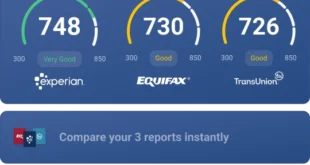Credit Bureau Security Alerts: Protect Your Financial Identity. In today’s digital era, safeguarding personal financial information is more crucial than ever. Credit bureau security alerts serve as a protective measure against identity theft, fraud, and unauthorized access to your credit file. Understanding how these alerts work and implementing them correctly can significantly enhance your financial security.
What Are Credit Bureau Security Alerts?
Credit bureau security alerts are notifications placed on your credit report to warn lenders and other financial institutions of potential fraudulent activity. These alerts help detect and prevent unauthorized credit inquiries or account openings in your name.
There are different types of security alerts, including:
- Fraud Alerts – A notice on your credit file that signals potential identity theft, requiring lenders to verify your identity before extending credit.
- Credit Freezes – A restriction that prevents anyone from accessing your credit report unless lifted by you.
- Active Duty Alerts – Special alerts designed for military personnel to protect against fraud while deployed.
- Extended Fraud Alerts – Available for confirmed identity theft victims, lasting up to seven years with additional verification measures.
How Credit Bureau Security Alerts Work
When a security alert is placed on your credit file, lenders and creditors are notified to take extra precautions before granting credit. Depending on the alert type, they may need to contact you directly for identity verification, thereby reducing the chances of fraudulent activity.
Steps to Activate a Credit Bureau Security Alert
- Contact Major Credit Bureaus – Reach out to Equifax, Experian, and TransUnion to place an alert.
- Provide Identification – Submit personal details such as your Social Security number and government-issued ID.
- Specify Alert Duration – Choose between short-term fraud alerts (90 days) or extended fraud alerts (up to 7 years).
- Monitor Credit Activity – Regularly check your credit report to ensure the alert is working effectively.
Benefits of Using Credit Bureau Security Alerts
- Prevents Unauthorized Credit Applications – Alerts notify lenders of potential fraud, stopping identity thieves in their tracks.
- Enhances Personal Security – Adds an extra layer of protection against data breaches and identity theft.
- Helps Maintain a Healthy Credit Score – Prevents fraudulent activities that could negatively impact your credit rating.
- Provides Peace of Mind – Knowing that your financial identity is protected reduces stress and anxiety.
Potential Drawbacks to Consider
- May Delay Legitimate Applications – Extra verification steps can slow down credit approvals.
- Limited Protection for Existing Accounts – Alerts primarily guard against new credit fraud, not unauthorized transactions on current accounts.
- Requires Monitoring and Renewal – Some alerts expire after a set period and must be renewed manually.
10 Essential Tips for Using Credit Bureau Security Alerts Effectively
- Place an Initial Fraud Alert Immediately – If you suspect identity theft, set up a fraud alert as soon as possible.
- Freeze Your Credit for Maximum Protection – A credit freeze offers the highest level of security against fraud.
- Use Multi-Factor Authentication – Enable two-step verification on financial accounts for added safety.
- Regularly Check Your Credit Reports – Request free reports from each bureau and look for suspicious activity.
- Update Contact Information – Ensure your phone number and email are current for alert notifications.
- Limit Sharing Personal Data Online – Reduce exposure to cyber threats by safeguarding personal details.
- Utilize Identity Theft Protection Services – Consider using professional services to monitor your credit.
- Create Strong Passwords – Use complex passwords and update them regularly.
- Educate Family Members on Security Measures – Teach relatives, especially seniors, about credit fraud risks.
- Renew Alerts as Needed – Keep track of expiration dates and extend alerts when necessary.
10 Frequently Asked Questions (FAQs) About Credit Bureau Security Alerts
1. How long does a fraud alert last?
A standard fraud alert lasts for 90 days, while an extended fraud alert can remain for up to seven years.
2. Will a credit freeze affect my credit score?
No, a credit freeze does not impact your credit score, but it restricts new account openings.
3. Can I still use my credit card with a credit freeze?
Yes, existing credit accounts remain active, but new credit applications will be restricted.
4. Do I have to pay to set up a credit bureau security alert?
No, fraud alerts and credit freezes are free services offered by credit bureaus.
5. Can I remove a security alert before it expires?
Yes, you can request the removal of a fraud alert or credit freeze anytime by contacting the credit bureau.
6. Will lenders automatically approve my credit if I have an alert?
No, lenders must verify your identity before approving new credit applications.
7. How do I lift a credit freeze temporarily?
You can temporarily lift a credit freeze online or by phone using a PIN provided by the bureau.
8. What should I do if I suspect fraud?
Immediately place a fraud alert, monitor your credit, and report any suspicious activity to the authorities.
9. Are credit bureau security alerts the same as credit monitoring?
No, security alerts notify creditors of potential fraud, while credit monitoring tracks your credit activity in real time.
10. Do all three credit bureaus need to be notified?
Yes, it is best to place alerts with Equifax, Experian, and TransUnion for full protection.
Conclusion
Credit bureau security alerts are essential tools for safeguarding your financial identity against fraud and identity theft. By placing fraud alerts, utilizing credit freezes, and staying vigilant, you can effectively reduce the risk of unauthorized access to your credit file. While these security measures may introduce some minor inconveniences, the benefits far outweigh the drawbacks.
Taking proactive steps to protect your credit ensures that your financial reputation remains intact. Whether you are preventing fraud or recovering from identity theft, leveraging security alerts from credit bureaus is a smart and responsible financial decision.
 credit.suarajatim.com
credit.suarajatim.com
